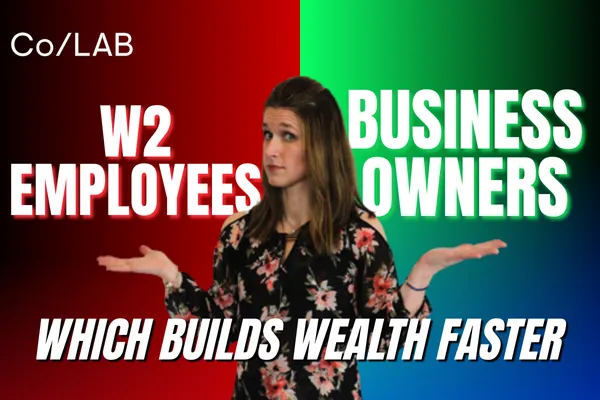BLOG
Mortgage, Real Estate, and Entrepreneurship


Loan Officer Wealth Gap: W2 vs Business Owner Income (5 Reasons to Own Your Career)
The Real Wealth Divide: Why Loan Officers Who Own Their Business Build More Wealth Than W2 Employees
If you’re a loan officer, you probably say this to renters all the time:
“Stop throwing your money away each month and start building equity in your own home.”
But here’s the question I want to flip back on you:
Why are you throwing money away working in someone else’s business—and not building equity in your own?
It’s time we talk about one of the least-discussed wealth gaps in America: W2 employee income versus business owner income. And loan officers, this affects you more than you might realize.
Because if you’re still cashing in commission checks as an employee—or even a 1099 contractor—you’re missing out on the exact same wealth-building opportunities that you tell your clients about every day. The truth is, business owners have four times the wealth of W2 employees. That’s not just a stat, that’s a wake-up call.
Today, I’m going to break down five reasons why loan officers who own their business grow exponentially more wealth than those who stay as employees. And by the end, you’ll understand why it might be time to stop “renting” your career and start owning it.
1. W2 Income vs. Business Income: The Hidden Ceiling
Let’s start with the basics.
As a W2 employee, your income has a ceiling. You work. You close loans. You get paid. Every dollar you earn is taxed at the highest rate possible—straight off the top.
Say you make $200,000 as a loan officer at a mortgage company. Sounds great, right? But after federal, state, Social Security, and Medicare taxes, that paycheck shrinks fast. Add in your lack of control over how you’re taxed, and suddenly that $200,000 doesn’t feel like $200,000 anymore.
Now let’s compare that to a loan officer who owns their brokerage. On paper, they also earned $200,000. But here’s the difference:
They pay themselves a smaller salary.
They take the rest as distributions (taxed differently, often at a lower rate).
They write off legitimate business expenses—marketing, office space, even part of their travel (see tools you’ll need as a new broker).
So while both might look equal on paper, the business owner keeps far more cash in their pocket. The structure of income—not just the amount—makes the difference.
Quick Summary: W2 income is capped, taxed heavily, and inflexible. Business income is structured for strategy, efficiency, and wealth building.
2. Building Equity: Your Job Isn’t an Asset
Here’s the thing about being an employee: you can’t sell your job.
You can trade your time for money. You can even negotiate a sign-on bonus. But at the end of the day, you walk away with nothing. No asset. No equity. No future value.
Now compare that to owning a business. When you build a mortgage brokerage—or any business—you’re creating an asset that grows in value. That asset can operate without you. It can be passed on. It can even be sold (here’s what my first 90 days looked like as a broker).
I didn’t fully understand this until I sold a portion of my mortgage company. When I sold just 5% equity, I walked away with a $50,000 check. And I still had 45% left to sell! That moment was my “aha”—equity is the real wealth builder.
Quick Summary: Equity is to business what homeownership is to housing. Renters never build wealth—neither do W2 employees. Business owners do.
3. Taxes: The Wealth Killer (and How Business Owners Beat It)
Let’s talk about the not-so-sexy topic that separates employees from entrepreneurs: taxes.
W2 loan officers get taxed on every dollar they make, before expenses. Earn $200,000? You could easily pay $50,000–$70,000 in taxes.
Now let’s look at a loan officer who owns their business:
Pay themselves a $60,000 salary.
Take $140,000 in distributions.
Write off business expenses (travel, vehicle mileage, office space, even meals).
The result? Their total tax bill drops to around $39,700. That’s over $11,000 in savings—just from restructuring income.
Stack on top the Qualified Business Income (QBI) deduction, where 20% of certain business income isn’t taxed at all, and the savings grow even larger (this is one of the biggest advantages of setting up your mortgage company the right way).
Quick Summary: W2 employees pay more taxes. Business owners keep more money, redirect it into wealth-building, and scale faster.
4. Freedom of Time and Scalability
As a W2 loan officer, your income is tied directly to your effort. No loans closed? No paycheck.
You can’t take two weeks off without your pipeline (and your income) stalling. You’re stuck in the time-for-money trap.
Business ownership changes the game. You can:
Hire processors, loan officers, and assistants (discover how with our Broker Concierge model).
Automate marketing and back-end operations.
Build systems that generate income even when you’re not in the office.
And yes, managing people comes with challenges. But you already manage clients, lenders, and underwriters—except you don’t get to choose them. Owning your business gives you the freedom to decide who’s on your team, how you want to grow, and how much time you want back.
Quick Summary: Employees work harder to earn more. Business owners build teams and systems that let them scale income without scaling hours.
5. Net Worth: The Numbers Don’t Lie
Let’s put all of this into perspective with some hard numbers:
Average net worth of a W2 employee in the U.S.: $192,000
Average net worth of a business owner: $1.3 million
That’s not a small gap—it’s a canyon. And the difference is ownership.
Even high-earning loan officers who make six figures annually often end up with limited wealth at retirement because they never built an asset. Meanwhile, brokers and business owners who scale and eventually sell their businesses walk away with financial freedom (here’s how to set up a brokerage the right way).
Quick Summary: The math is undeniable. Loan officers who remain W2 employees cap their wealth. Those who build businesses multiply it.
Why This Matters for Loan Officers Today
If you’re a loan officer reading this, you already have what it takes to build a business. You’ve built a network. You know how to market. You know how to close loans.
You’ve already done the hardest part.
So why keep renting your career when you could own it?
Think about it: You’d never tell a renter to stay stuck paying someone else’s mortgage. So why are you still “renting” your time, your skills, and your future from your employer?
Final Thoughts: Stop Renting, Start Owning
The path to wealth isn’t hustling harder for someone else. It’s figuring out how to build equity for yourself.
W2 income is capped. Business income scales.
Jobs can’t be sold. Businesses can.
Employees pay more taxes. Business owners keep more money.
Employees trade time for money. Business owners buy back time.
Employees retire with limited savings. Business owners build legacy-level wealth.
The question is simple: Are you ready to stop renting your career and start owning your future?
At Co/LAB, we help loan officers just like you transition from top-producing employees to successful mortgage brokerage owners. We’ve built the models, systems, and support to make it achievable—even if you don’t know where to start.
👉 Book a discovery call with me and my team today. Let’s talk about how you can stop throwing your career money away and start building something that’s yours.
Frequently Asked Questions (FAQs)
1. Can I really start a mortgage brokerage if I’ve only ever been a loan officer?
Yes! Most brokers start out as top-producing loan officers. At Co/LAB, we provide the systems, compliance support, and structure so you don’t have to reinvent the wheel.
2. Do I need a ton of money to start my own mortgage company?
Not necessarily. Many brokers launch lean, then scale. We show you how to structure expenses and reinvest profits strategically so you can grow without overextending yourself.
3. What if I don’t want to manage a big team?
You don’t have to. Some brokers stay small and profitable, while others scale into full firms. Ownership means you get to decide.
4. Is it risky to leave a W2 job for ownership?
There’s always risk in change—but the bigger risk is staying stuck in a structure that limits your income and wealth. With the right support, the risk is manageable and the upside is life-changing.
5. How do I get started?
Start with a conversation. Book a discovery call and we’ll walk you through your next best step based on where you are today.
Megan Marsh
Founder, Co/LAB Broker Concierge
In Case You Missed Our Previous Blogs & YouTube Videos..
Read Here: How to Add Commercial Loans to Your Mortgage Business | Grow Your Income in 2025
This blog reveals how mortgage brokers and loan officers can unlock a lucrative new revenue stream by adding commercial lending to their business. I share why now is the perfect time, what types of deals to target, the documents and skills you’ll need, and how to avoid common pitfalls. You’ll learn how to leverage your existing skills, expand your client base, and earn bigger commissions—without spending $10K on a course—through the proven systems and community inside The Lab.
Read Here: How to Start a Mortgage Company | Costs, Licensing & Franchise Tips
Thinking about starting your own mortgage brokerage?
In this post, I share the real truth from my own journey—what it actually takes to launch a brokerage, the hidden startup costs, the risks no one talks about, and whether DIY or a franchise model makes more sense. If you’re a loan officer, agent, or advisor dreaming of bigger paychecks, more freedom, or building a lasting legacy, this is the guide I wish I had before I started.
Mortgage Broker Support
Need help starting your mortgage business? Our Mortgage Broker Concierge Team is here to assist you!
If you’re curious about how we can help you simplify your operations beyond what our videos offer and want to know how you can make launching or running your brokerage stress-free, the link below explains everything. No fluff, no “exclusive training” gimmicks—just a straightforward way to see how we work with brokers to take backend tasks off their plates. Check it out here: https://colablendingfranchise.com/book-a-discovery-call

Loan Officer Wealth Gap: W2 vs Business Owner Income (5 Reasons to Own Your Career)
The Real Wealth Divide: Why Loan Officers Who Own Their Business Build More Wealth Than W2 Employees
If you’re a loan officer, you probably say this to renters all the time:
“Stop throwing your money away each month and start building equity in your own home.”
But here’s the question I want to flip back on you:
Why are you throwing money away working in someone else’s business—and not building equity in your own?
It’s time we talk about one of the least-discussed wealth gaps in America: W2 employee income versus business owner income. And loan officers, this affects you more than you might realize.
Because if you’re still cashing in commission checks as an employee—or even a 1099 contractor—you’re missing out on the exact same wealth-building opportunities that you tell your clients about every day. The truth is, business owners have four times the wealth of W2 employees. That’s not just a stat, that’s a wake-up call.
Today, I’m going to break down five reasons why loan officers who own their business grow exponentially more wealth than those who stay as employees. And by the end, you’ll understand why it might be time to stop “renting” your career and start owning it.
1. W2 Income vs. Business Income: The Hidden Ceiling
Let’s start with the basics.
As a W2 employee, your income has a ceiling. You work. You close loans. You get paid. Every dollar you earn is taxed at the highest rate possible—straight off the top.
Say you make $200,000 as a loan officer at a mortgage company. Sounds great, right? But after federal, state, Social Security, and Medicare taxes, that paycheck shrinks fast. Add in your lack of control over how you’re taxed, and suddenly that $200,000 doesn’t feel like $200,000 anymore.
Now let’s compare that to a loan officer who owns their brokerage. On paper, they also earned $200,000. But here’s the difference:
They pay themselves a smaller salary.
They take the rest as distributions (taxed differently, often at a lower rate).
They write off legitimate business expenses—marketing, office space, even part of their travel (see tools you’ll need as a new broker).
So while both might look equal on paper, the business owner keeps far more cash in their pocket. The structure of income—not just the amount—makes the difference.
Quick Summary: W2 income is capped, taxed heavily, and inflexible. Business income is structured for strategy, efficiency, and wealth building.
2. Building Equity: Your Job Isn’t an Asset
Here’s the thing about being an employee: you can’t sell your job.
You can trade your time for money. You can even negotiate a sign-on bonus. But at the end of the day, you walk away with nothing. No asset. No equity. No future value.
Now compare that to owning a business. When you build a mortgage brokerage—or any business—you’re creating an asset that grows in value. That asset can operate without you. It can be passed on. It can even be sold (here’s what my first 90 days looked like as a broker).
I didn’t fully understand this until I sold a portion of my mortgage company. When I sold just 5% equity, I walked away with a $50,000 check. And I still had 45% left to sell! That moment was my “aha”—equity is the real wealth builder.
Quick Summary: Equity is to business what homeownership is to housing. Renters never build wealth—neither do W2 employees. Business owners do.
3. Taxes: The Wealth Killer (and How Business Owners Beat It)
Let’s talk about the not-so-sexy topic that separates employees from entrepreneurs: taxes.
W2 loan officers get taxed on every dollar they make, before expenses. Earn $200,000? You could easily pay $50,000–$70,000 in taxes.
Now let’s look at a loan officer who owns their business:
Pay themselves a $60,000 salary.
Take $140,000 in distributions.
Write off business expenses (travel, vehicle mileage, office space, even meals).
The result? Their total tax bill drops to around $39,700. That’s over $11,000 in savings—just from restructuring income.
Stack on top the Qualified Business Income (QBI) deduction, where 20% of certain business income isn’t taxed at all, and the savings grow even larger (this is one of the biggest advantages of setting up your mortgage company the right way).
Quick Summary: W2 employees pay more taxes. Business owners keep more money, redirect it into wealth-building, and scale faster.
4. Freedom of Time and Scalability
As a W2 loan officer, your income is tied directly to your effort. No loans closed? No paycheck.
You can’t take two weeks off without your pipeline (and your income) stalling. You’re stuck in the time-for-money trap.
Business ownership changes the game. You can:
Hire processors, loan officers, and assistants (discover how with our Broker Concierge model).
Automate marketing and back-end operations.
Build systems that generate income even when you’re not in the office.
And yes, managing people comes with challenges. But you already manage clients, lenders, and underwriters—except you don’t get to choose them. Owning your business gives you the freedom to decide who’s on your team, how you want to grow, and how much time you want back.
Quick Summary: Employees work harder to earn more. Business owners build teams and systems that let them scale income without scaling hours.
5. Net Worth: The Numbers Don’t Lie
Let’s put all of this into perspective with some hard numbers:
Average net worth of a W2 employee in the U.S.: $192,000
Average net worth of a business owner: $1.3 million
That’s not a small gap—it’s a canyon. And the difference is ownership.
Even high-earning loan officers who make six figures annually often end up with limited wealth at retirement because they never built an asset. Meanwhile, brokers and business owners who scale and eventually sell their businesses walk away with financial freedom (here’s how to set up a brokerage the right way).
Quick Summary: The math is undeniable. Loan officers who remain W2 employees cap their wealth. Those who build businesses multiply it.
Why This Matters for Loan Officers Today
If you’re a loan officer reading this, you already have what it takes to build a business. You’ve built a network. You know how to market. You know how to close loans.
You’ve already done the hardest part.
So why keep renting your career when you could own it?
Think about it: You’d never tell a renter to stay stuck paying someone else’s mortgage. So why are you still “renting” your time, your skills, and your future from your employer?
Final Thoughts: Stop Renting, Start Owning
The path to wealth isn’t hustling harder for someone else. It’s figuring out how to build equity for yourself.
W2 income is capped. Business income scales.
Jobs can’t be sold. Businesses can.
Employees pay more taxes. Business owners keep more money.
Employees trade time for money. Business owners buy back time.
Employees retire with limited savings. Business owners build legacy-level wealth.
The question is simple: Are you ready to stop renting your career and start owning your future?
At Co/LAB, we help loan officers just like you transition from top-producing employees to successful mortgage brokerage owners. We’ve built the models, systems, and support to make it achievable—even if you don’t know where to start.
👉 Book a discovery call with me and my team today. Let’s talk about how you can stop throwing your career money away and start building something that’s yours.
Frequently Asked Questions (FAQs)
1. Can I really start a mortgage brokerage if I’ve only ever been a loan officer?
Yes! Most brokers start out as top-producing loan officers. At Co/LAB, we provide the systems, compliance support, and structure so you don’t have to reinvent the wheel.
2. Do I need a ton of money to start my own mortgage company?
Not necessarily. Many brokers launch lean, then scale. We show you how to structure expenses and reinvest profits strategically so you can grow without overextending yourself.
3. What if I don’t want to manage a big team?
You don’t have to. Some brokers stay small and profitable, while others scale into full firms. Ownership means you get to decide.
4. Is it risky to leave a W2 job for ownership?
There’s always risk in change—but the bigger risk is staying stuck in a structure that limits your income and wealth. With the right support, the risk is manageable and the upside is life-changing.
5. How do I get started?
Start with a conversation. Book a discovery call and we’ll walk you through your next best step based on where you are today.
Megan Marsh
Founder, Co/LAB Broker Concierge
In Case You Missed Our Previous Blogs & YouTube Videos..
Read Here: How to Add Commercial Loans to Your Mortgage Business | Grow Your Income in 2025
This blog reveals how mortgage brokers and loan officers can unlock a lucrative new revenue stream by adding commercial lending to their business. I share why now is the perfect time, what types of deals to target, the documents and skills you’ll need, and how to avoid common pitfalls. You’ll learn how to leverage your existing skills, expand your client base, and earn bigger commissions—without spending $10K on a course—through the proven systems and community inside The Lab.
Read Here: How to Start a Mortgage Company | Costs, Licensing & Franchise Tips
Thinking about starting your own mortgage brokerage?
In this post, I share the real truth from my own journey—what it actually takes to launch a brokerage, the hidden startup costs, the risks no one talks about, and whether DIY or a franchise model makes more sense. If you’re a loan officer, agent, or advisor dreaming of bigger paychecks, more freedom, or building a lasting legacy, this is the guide I wish I had before I started.
Mortgage Broker Support
Need help starting your mortgage business? Our Mortgage Broker Concierge Team is here to assist you!
If you’re curious about how we can help you simplify your operations beyond what our videos offer and want to know how you can make launching or running your brokerage stress-free, the link below explains everything. No fluff, no “exclusive training” gimmicks—just a straightforward way to see how we work with brokers to take backend tasks off their plates. Check it out here: https://colablendingfranchise.com/book-a-discovery-call
Are You Ready...
to Start Building a Legacy and Not Just a Business?
AS FEATURED IN:







Co/LAB Broker Services Corporate
8795 Peach Street, Erie, PA 16506
Company
Resources
Learn more about who we are, what we do, and how we can help you by visiting our other company websites.





